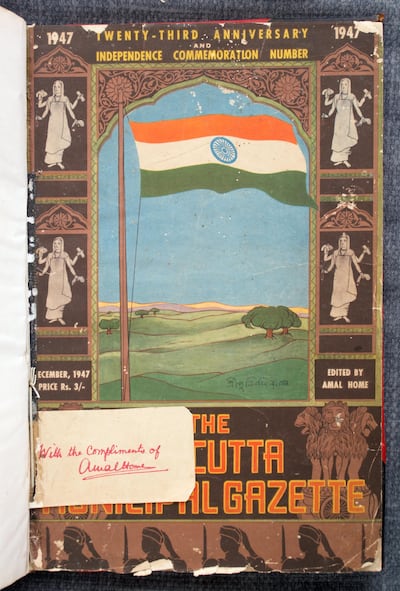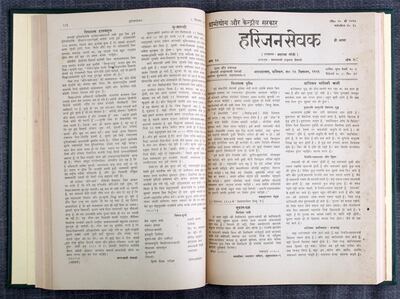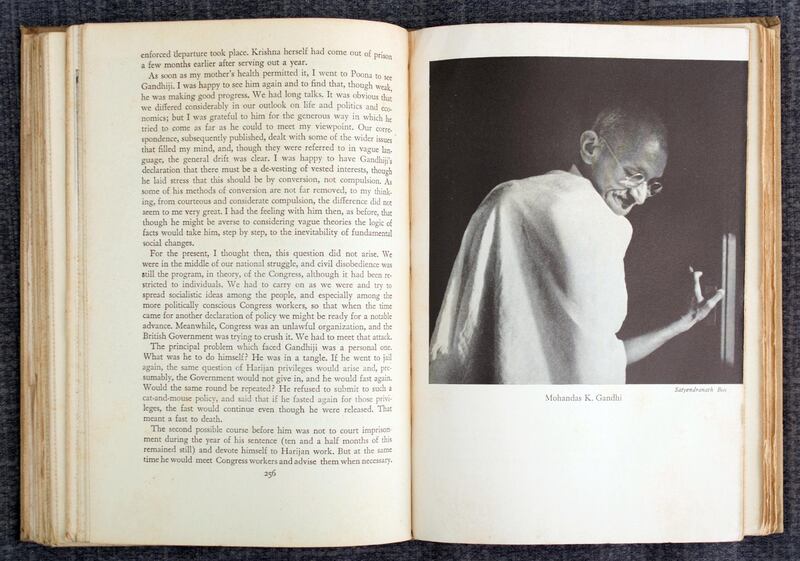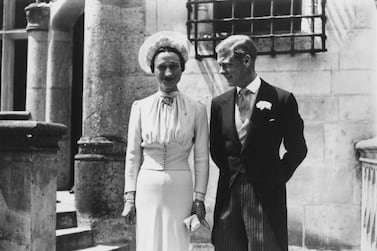Subhas Chandra Bose, one of India's most prominent freedom fighters and historical figures, has captivated millions of Indians through the decades. He's long been celebrated as a hero, but he also attempted to rid India of British rule during the Second World War with the help of Nazi Germany and Imperial Japan.
That move was at odds with the non-violent methods of Mahatma Gandhi – although they remained deeply respectful contemporaries – and Bose's dynamism has been fodder for numerous films over the years. So for history buffs and those particularly fascinated with his legacy, few books would elicit as much excitement as a first edition of Testament of Subhas Bose: 1942-1945, which was published by Rajkamal in 1946. And now, it's up for sale.
Prinseps – a research-focused auction house in Mumbai that since 2017 has hosted online auctions of unique and rare collectibles, antiques, books and paintings – has put books on Bose, as well as many other important Indian freedom fighters, up for auction until Sunday, in celebration of India's Republic Day. The timing is perfect, considering India has rarely, if at all, had a book auction specifically themed on the country's independence movement.
Perhaps most importantly, however, is that this is Prinseps' first no-reserve auction, which means bids on all items start at 1,000 rupees (Dh52). This is part of the organisation's aim to make collectibles and art accessible to everyone.

It is also open internationally – the auction is online – with no exceptions.
"Our first books auction had pre-independence-era books but they were largely written by the British and other European authors," says Menaka Mahtab, vice president at Prinseps and curator of this auction. "The books we've got for this no-reserve nationalism auction reflect Indians' points of view."
So why the low starting point for bids? Mahtab says a lot of the items are not only extremely rare but also less well-known. They all have strong provenances – many from the estates of renowned 19th-century jurist and politician Nirmal Chatterjee or Rathindranath Tagore (son of Nobel laureate Rabindranath Tagore) and his partner Mira Chatterjee. However, Mahtab says "most people do not know that many of these books even exist. Some were never reprinted". This also meant that it was difficult to ascertain the value of several of the books and hence these are pegged at the kind of worth researchers and experts assume.
Some items are more well known, though. Take, for instance, the 70 volumes of The Collected Works of Mahatma Gandhi, signed by Nirmal Chatterjee. A collection of Gandhi's writings, letters, essays and interviews – compiled over about 40 years – are a rare find. A fantastic collectible, the books are dated between 1884 and 1948, when Gandhi was assassinated.
The lot is valued between 200,000 rupees and 600,000 rupees, although it's possible they'll go for much more.
There are other gems, too, such as K S Giani's Indian Independence Movement in East Asia (1947), which contains a fascinating account of Indians who travelled to Japan, China, Thailand and Malaysia to organise revolutionaries, fight for India's independence and enlist the help of those governments to fuel the movement. There is also Gandhi's Satyagraha in South Africa (1928, first edition), which recounts his experience in South Africa when he lived there at the end of the 19th century and exercised satyagraha (non-violent resistance) to block the local government's efforts to disenfranchise the Indians living there.

One of the best items pertaining to Gandhi on the online auction is 1953-1954's Harijan Sevak, written in Hindi. A weekly journal started by the freedom activist, it was carried forth by the Harijan Sevak Sangh, a non-profit organisation set up to increase awareness of a campaign against untouchability, or the social ostracism of the lowest caste by higher castes, which is one of Gandhi's most enduring legacies. "Harijan" was a term coined by Gandhi to refer to people from the untouchable caste and means "men / women of God".
The edition of the journal on sale contains all 52 weeklies and is of major historical importance, even though it was published after Gandhi was killed. It is valued at up to 500,000 rupees. "This is an extremely rare acquisition," says Mahtab. "We were only able to source this one complete journal of the Harijan Sevak."
In keeping with his opposition of the caste system, Gandhi began a "fast unto death" in September 1932 while he was in jail to protest against the British government's decision to separate India's electorate by caste. The 11-day fast, which nearly killed him, is covered in The Epic Fast, written by Pyarelal, which is going under the hammer.
There's also a collection of old letters from former India prime minister Jawaharlal Nehru's collection, including his correspondence with Gandhi. One of the letters demonstrates that despite their political differences, Gandhi and Nehru remained extremely fond of each other and the former was especially confident of Nehru's ability to lead India. Speaking of Nehru, the auction also has the first edition of his autobiography, The Discovery of India, which he wrote during his imprisonment right up until India became independent in 1947.
Other items of great interest in the auction are a few issues of Desh – a prestigious literary magazine launched by ABP in 1933 – and Matrubhumi magazine, each in Bengali, as well as an edition of the rare book The Springing Tiger by British general Hugh Toye. It is a critique of Bose's volatile Azad Hind Fauj (Free India Army) and was published in 1959.
In addition, there are a series of prints from the 1940s by Shyam Sunder Lal’s Cawnpore printing press, featuring freedom fighters and nationalist slogans, items that were considered seditious by the British. “We added these towards the end,” says Mahtab.
The prints provide significant information regarding how propaganda was spread throughout India to help the struggle for independence. "Language was no barrier, the posters were easily accessible because people pasted them all over towns and they were mass produced," says Mahtab.

A few of the prints display the words "Jai Hind" (Victory to India), a slogan that has stuck over time and is as common in India today as saying "cheers" in parts of the western world.
The success of this auction will set the tone for future events, given that books in India have rarely gone under the hammer based on such a specific patriotic theme. But as collector's items, these books are treasures, offering rare insights into the history of the country's birth as an independent nation.
Bidding ends at 7pm on Sunday. More information is available at www.prinseps.com







